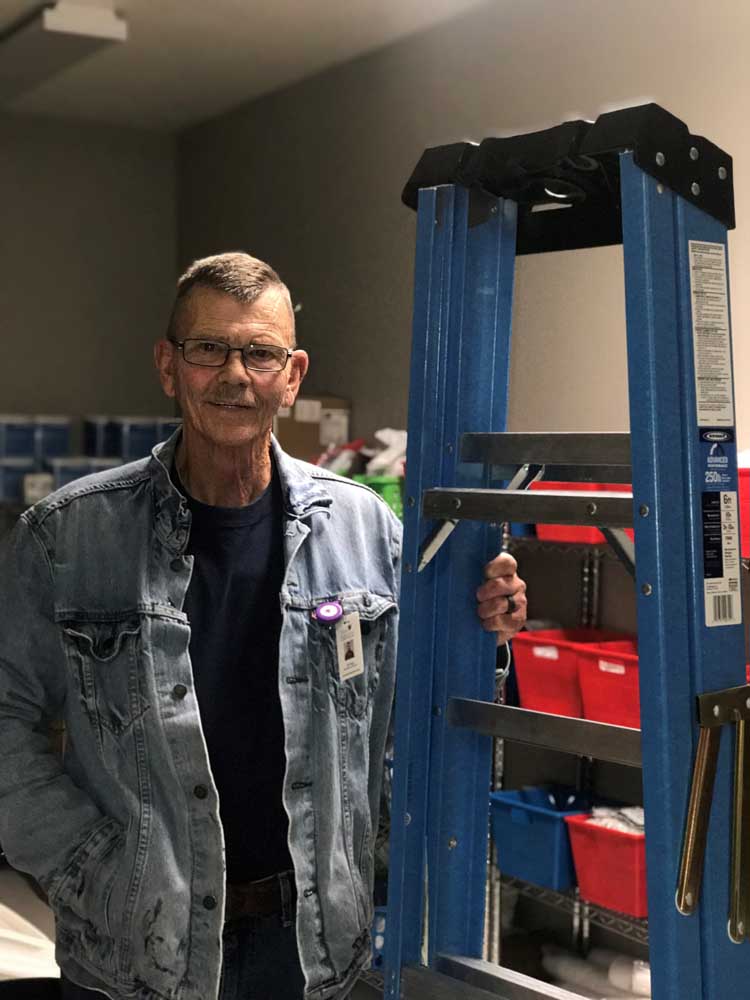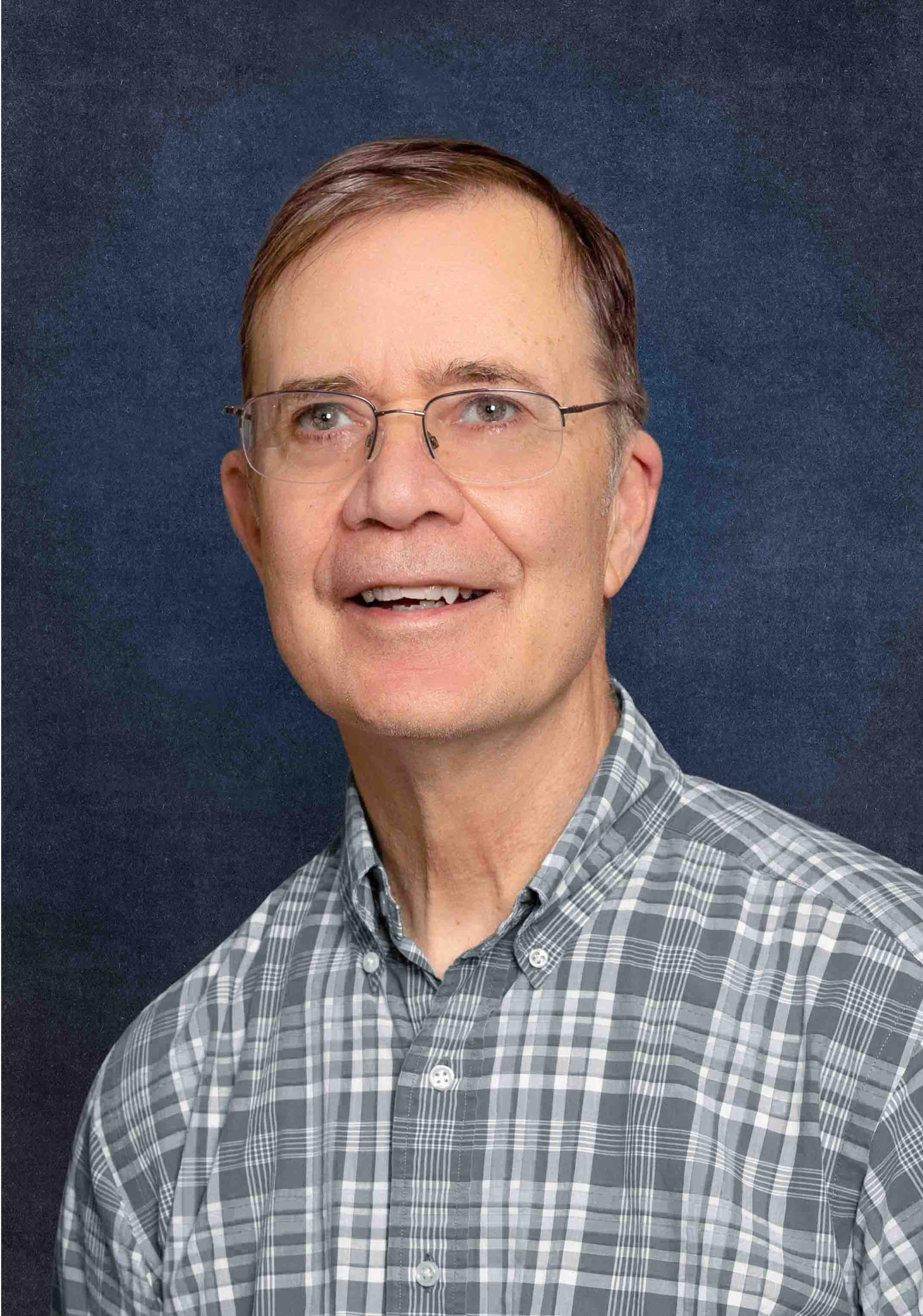East Texas cancer, stroke survivor recovers, works for the company who ‘saved his life’
Published 7:05 pm Friday, May 14, 2021

- Carl Hogan holds a ladder at NeuroRestorative, where he now works in Garland in the maintenance department.
Carlton Hogan woke up on a summer morning to go to church with his wife Lela in 2018. He had a massive headache. As he reached for his Tylenol, he could hardly hold the bottle. His left leg was hurting and tingling as if it was asleep. He didn’t know what was happening until Lela told him he was having a stroke.
“I actually argued with her and told her to get in the truck, we were going to church,” he said.
Trending
“Within a matter of minutes, I saw all of the signs. I saw his face go slight on the left side,” Lela Hogan said.
From there, he went to the Methodist Dallas Medical Center, where he spent over a week in the intensive care unit. The day after he was admitted, he suffered another stroke, this one much stronger.
Carlton Hogan, 59, of Wills Point, didn’t know it then, but he was suffering from a middle cerebral artery stroke, which caused problems with swallowing, speech and left-sided weakness.
“I couldn’t walk, I was wheelchair bound. I couldn’t use my left arm, I couldn’t see to the left side of me. When I would write on paper, I’d always start in the middle of the page instead of the left side,” Carlton Hogan said.
At the ICU, doctors told him he most likely wouldn’t be able to drive or go back to work anymore, but they made it clear that their goal was to try their best to get him back to independence.
Strokes, specifically the one he suffered from, often causes problems with critical and concrete thinking. Lela Hogan explained that when he heard, “You may not” he was actually internalizing and heard, “You never will.”
Trending
This triggered something in Carlton Hogan.
Hearing “You can’t,” took him back to that place he was in 10 years prior to his stroke, when he was diagnosed with throat cancer. It was just before Thanksgiving in 2009.
“Until he could possibly not go to work, he wasn’t going to let it get him down. He was a fighter, that’s just how he is. When he had the stroke, I actually told him, ‘I really need your stubbornness to kick in and fight,’ and he did. He’s a fighter. I think that’s the key, for any stroke patient that has a chance, that’s the key, for them to fight,” Lela Hogan said.
Carlton Hogan went through chemotherapy and radiation and went into remission in May 2010. He is now an 11-year cancer survivor.
After his time at Methodist Dallas, he also went to Baylor, Scott & White to begin therapy.
“I was just scared to death. I haven’t been around many people who have had strokes, except at the nursing home, because I worked in long term care, and everyone I had been around in the nursing home who had a stroke, they just kind of sat around, and I wasn’t going to let that happen to me. They were just very dependent on everybody. They couldn’t get up, they couldn’t dress themselves, they couldn’t go to the bathroom or shower themselves, that just scared me. I wasn’t going to let that happen to me, I was going to fight and get back to where I wanted to be,” Carlton Hogan said.
One of the biggest motivations during his recovery process was to return to work to see all of the residents at the nursing home where he was working. He said he wanted to make sure they were taken care of. His family was also his biggest motivation to recover.
While he was being treated at Baylor, Scott & White, he said he became very depressed because his son was set to marry to his fiancé. She always called him dad. Carlton Hogan wouldn’t be able to attend the destination wedding in Mexico and he felt defeated.
“My daughter-in-law came into the hospital and laid down beside me and told me, ‘Dad, we’re going to wait and get married in Texas, but I want you to get better so you can hold your grandbaby. I said, ‘You’re pregnant?’ She said, ‘No, but as soon as we get married, we’re going to work on it.’ That gave me all the motivation in the world right there to get better,” he said.
After his time at Baylor Scott & White, he had improved so much within 41 days that it was time to go to a transitional facility to prepare him to go home.
Lela Hogan found NeuroRestorative in Tyler through a church friend. At NeuroRestorative, she met with Kristy Easley, who she said understood their needs.
What sold her on deciding whether her husband would receive therapy or not, was the fact that they were open to family members and them being a part of the care plan, she said.
“That touched me because Carl and I are a team. Same thing happened when he went through cancer. It was our journey, it wasn’t just him by himself. It affected both of us and we were on this journey together,” Lela Hogan said.
When he arrived at NeuroRestorative, they began to work on his motor challenges, cognitive thinking, left visual attention and how well he could read and write.
Treatment was tailored to his needs, such as relearning how to open a Sweet ‘N Low packet and learning when he was doing something that was unsafe. At one point, Carlton Hogan said when he arrived, his physical therapist handed him a screwdriver and told him to change an air vent, because this is something he would normally do at work.
This helped him recover faster and be back to work sooner.
Easley, who is a speech language pathologist, said they began by acknowledging and recognizing changes.
“We did that by putting him in situations where he could see the errors that he wouldn’t normally make, and that took time. It took a while, that was something Lela and I talked about,” Easley said.
This helped Carlton Hogan have better safety skills.
Lela Hogan had retired from teaching the year before her husband’s stroke. He wasn’t able to return to work for months, so when a part-time teaching job came open, she told Carlton she was going to have to do this to help cover the bills, since he was only receiving disability.
The couple juggled their temporary plans, with Lela Hogan being off every Wednesday. She would travel from their hometown Wills Point to Tyler, to spend time with Carlton at NeuroRestorative, which then was located at UT Health.
She would return to Wills Point that same day and come back on Friday to pick her husband up from therapy and spend the weekend at home.
“From July to December, I was living by myself, alone at home and taking care of everything. That’s another thing that drove him because he felt like he was letting me down as a husband, which he wasn’t, but that drove to continue to get better,” Lela Hogan said.
When he would visit home, a church friend, who is a truck driver, would visit Carlton Hogan at his home in the country, where they would practice driving around.
Between practicing and recovering, Hogan was finally able to learn how to drive again. He returned to work, which transitioned into working from home because of the COVID-19 pandemic. Soon after this transition, he received a call from his company, telling him they were doing away with his position.
The Hogans kept in touch with Easley through the company’s support group, who informed them there was a job opening for NeuroRestorative, where Hogan fully recovered. Without hesitation, he applied and got the job.
When the winter storm struck Texas in February, NeuroRestorative called Carlton to see if he had anyone who could help fix a problem in Houston. He stepped up and said he could handle it, which challenged him to drive there.
“I was real happy. I called my wife the whole time I was going and she called me, we had it on wireless so I could talk to her. She checked on me the whole way down, ‘Where are you at now, how are you doing?’ It was a team. Even though she wasn’t with me, we both went to Houston,” Carlton Hogan said. “The biggest part of my recovery, Lela was with me in my therapy. She was there when I took my first step and she was there when I was in physical therapy, she was there with me in speech therapy when Kristy had me talking a little better.”
He said God blessed him with his wife, and that it meant everything in the world to have her support. They will be celebrating their 35th anniversary this year in July. They have a son, who is 34 years old and a lieutenant for the Dallas Fire Department.
While Carlton was recovering at NeuroRestorative, the family found out his son and daughter-in-law were expecting a child. The Hogans now have a grandson.
“When we found out that we were going to be grandparents, Carl spread the word around Neuro, and I think that spurred him on too, because he knew he wanted to be able to be a normal grandfather and be able to play outside, pick him up and take him places. That was even more motivation. The folks at NeuroRestorative just kept reminding him of that,” Lela Hogan said.
These days, Carlton Hogan works for NeuroRestorative in Garland and is fully recovered.
NeuroRestorative closed its doors at UT Health in Tyler during the COVID-19 pandemic, but has a new facility under construction at a new campus, which will be opening in Tyler this summer.
“I appreciate everything Neuro did to get me back up and going. They don’t give up on anybody,” Carlton Hogan said.






